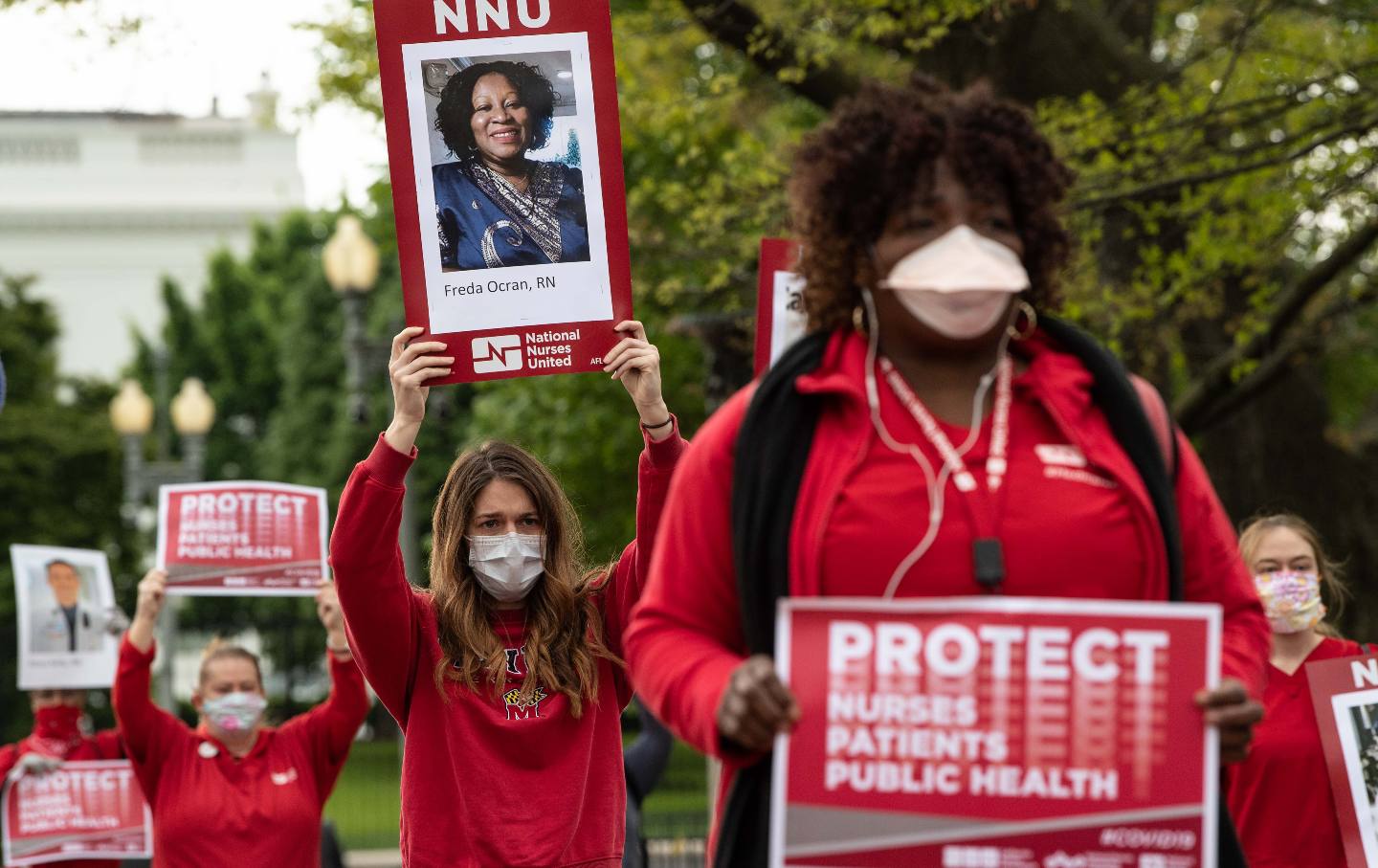
Nurses protest against the lack of personal protection equipment amid the Covid-19 pandemic in front of the White House in Washington, D.C., on April 21, 2020. (Nicholas Kamm / AFP via Getty Images)
What is the enduring image of the Covid-19 pandemic? For me, it is the nurse at the bedside, on the front lines of this global emergency, overcoming her own fear of illness to provide care to patients and to offer comfort in the face of likely death. For millions of nurses living in countries where Covid-19 vaccines continue to be scarce, this is an image of everyday life. But even in countries where the worst of the illness has dissipated, we are only beginning to understand the toll that this work—day after day—has taken on nurses’ lives.
We are in their debt, and that is why we must follow their lead. Right now, nurses unions from 28 different countries are rising up to defend their lives and to protect their patients by taking some of the world’s most powerful governments to court with a simple demand: Waive patents on Covid-19 vaccines, and end the pandemic now. I believe that it is essential for feminist movements not only to support these unions in their legal challenge, but also to make their struggle the central element of our organizing in the months to come.
In April this year, the United Kingdom’s prime minister, Boris Johnson, in widely reported public remarks after a week spent in the hospital recovering from Covid-19, paid tribute to “the two nurses who stood by his bedside” during his illness. About a month later, one of the nurses, Jenny McGee resigned from her post, fed up with his government’s treatment of health care workers. “The NHS saved my life, no question,” he said. A year in, NHS workers now face erosion of pay and pensions.
Here in the United States, we have heard nurses tell us stories of their physical exhaustion, lack of adequate equipment, and emotional pain at losing patients for whom they cared. Nurses’ lives, too, have been lost. According to the World Health Organization, at least 115,000 nurses globally have died due to Covid-19 infection, and many of those lives could have been saved if vaccines had been equitably produced and delivered.
Despite these challenges, nurses have mobilized continuously. They have denounced the failure of the hospitals, of the sanitary systems, and of the local and national authorities. And they have inspired a global movement to join them: Outside of windows and standing on balconies, we applauded nurses as “essential workers,” recognizing—for the first time in my memory—the role they play in our economies, societies, and daily lives.
But applause is insufficient. Nurses need for us to join their demands for better wages and safer working conditions. Their struggle demands no less than the reconfiguration of an entire global economic regime that systematically devalues our lives—the lives of women and the lives of carers, in particular—and instead values the precious patents that protect the profits of the pharmaceutical industries.
The present mobilization of the nurses against Big Pharma is, then, a feminist one. The devaluation of their work is directly related to the devaluation of women’s reproductive work, which has been a structural element of capitalist society throughout its history. Just as healing has always been women’s work—unrecognized, uncompensated—so too has nursing served as the invisible architecture of our social system.
That architecture is international: Look no further than the many nurses here in the United States who have been forced to migrate from their home countries on account of a long history of colonialism, a warming planet, and poverty conditions created by programs like “structural adjustment.”
To support our nurses, then, is not only to demand a better health care system. It is to challenge the colonial character of our society and the corporate domination of our economy—twin diseases just as dangerous as Covid-19 itself.
This call for a broad feminist effort on behalf of the nurses is long overdue. Health care workers have not only been on the front lines of this pandemic; they have also been at the forefront of our struggles for social justice everywhere. I vividly remember the Occupy encampments and the clashes with police when nurses came to aid of all those who attended.
The history of health care workers’ civic engagement is even longer. From the formation of the Cassandra Radical Nurses Network in 1982 to the Rebel Nursing initiative of 2000, nurses have been the first and the loudest to demand the provision of care—not only in hospitals but also in our communities and homes.
Consistent with this radical tradition, nurses today are unafraid to speak the truth about governments that dare to stand in the way of the simplest and most urgent demand: to vaccinate the world. In a complaint to the UN’s Special Rapporteur on Physical and Mental Health, they take on the powerful in the European Union, the United Kingdom, Norway, Switzerland, and Singapore. “These countries have violated our rights and the rights of our patients—and caused the loss of countless lives” and “now we testify,” they wrote.
The nurses are our guide out of this crisis and to the construction of a care-oriented society where no one is condemned to die because of their country of origin or corporate “ownership” of a life-saving technology.
To stand with the nurses of the world is, therefore, a primary feminist task—one that can unite women internationally and fulfill our commitment to a world in which life is at last placed at the center.
Silvia Federiciis professor emerita of political philosophy and international studies at New College of Hofstra University.